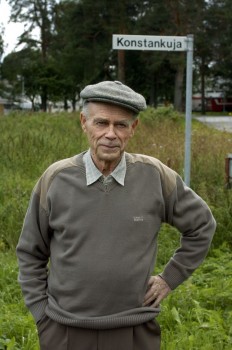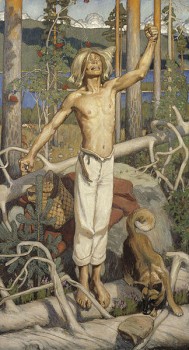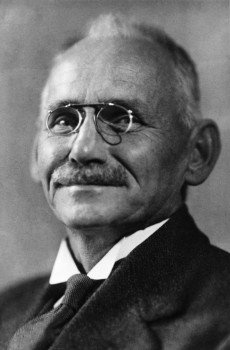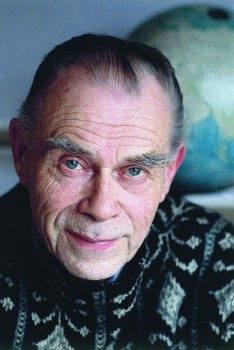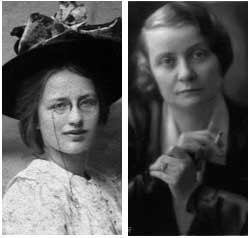Tag: classics
Not a day without pen and paper
14 March 2013 | This 'n' that
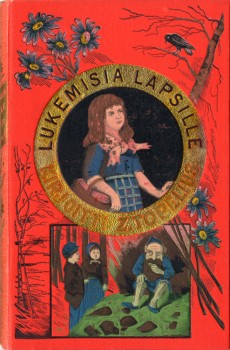
For use and fun: stories for children by Z. Topelius
Zacharias Topelius wrote every day for almost 70 years. His published works contain almost 16,000 pages.
As he was also the editor of the Swedish-language newspaper Helsingfors Tidningar which he published twice a week for 20 years, his output, counted in pages, is enormous.
Author, journalist, historian, critic and pedagogue Topelius (1818–1898) wrote poetry, hymns, travelogues, serials, articles, short stories, fairy tales, textbooks and plays.
As for Finnish translations, his historical serial Fältskärns berättelser (‘The barber-surgeon’s tales’, 1853–1867) and Läsning för barn (‘Reading for children’) are probably his most popular works.
In a bilingual (Swedish and Finnish), text-critical, annotated (and illustrated) project, entitled ‘Zacharias Topelius Skrifter’ (‘Z. T. writings’), Svenska Litteratursällskapet i Finland (the Society of Swedish Literature in Finland) will publish a large number of Topelius’s works in digital facsimile form. The selection grows continually.
Far from the madding crowd
21 February 2013 | Articles, Non-fiction
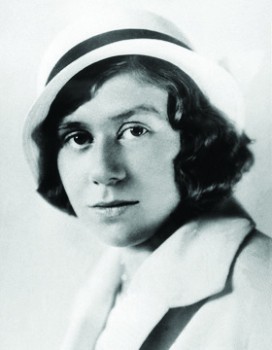
Saima Harmaja (1913–1937). Photo: WSOY
‘I don’t belong to the crowd,’ the young Saima Harmaja wrote in her diary in 1933. Her work as a poet was for her a vocation that superseded everything else. In her diaries she often speaks as a sociable young woman, with a delicious sense of humour, but her best poems seriously explore love, and death which cast its shadow over her. A selection of her poems – the best of which have made her a Finnish classic – is now published in English for the first time
In her diary the young poet claimed: ‘I think I would die if I could not write.’ What Harmaja shared with the poets of the early part of the twentieth century who influenced her was the private and personally experienced nature of poetry itself, rather than the realisation of any current aesthetic programme.
Harmaja is one of those poets whose works have passed through the hands of readers from decade to decade. She is also a prototype of the poet of her generation: gifts that led to the expectation of a brilliant career, a life that was brought to a tragic end by tuberculosis, leaving just five years of work as a poet. More…
Pop song lyrics
A ‘short special’: a previously unpublished text (written in the 1960s) from Luonnonkierto (‘Nature’s circle’, Siltala, 2012). Introduction by Jarmo Papinniemi
The pop song is a wide, mysterious world. It is like an ocean. Like a snow-covered desert. Like a rose garden. Like a perfume factory. The pop song is as mysterious as spring. The pop song is as whimsical as the restroom of the city hotel in Samarkand. The pop song is as coarse as your father’s eldest brother. Pop songs snag everyone, especially the young and the old. The best pop songs are foreign, because the words make no sense. Pop stars rise into the sky. Lovely young women step into the arena smelling of perfume and sing about love or tell playful stories about animals or nursery rooms. And then on the other end of life the stars go out and start to look for a place to be buried. But before dying they drone on in their gruff voices about the temptations of the big city, and love, which in a certain sense tortured and wore out those concerned…
Up here in Finland, we write and set pop songs to music as well. But I have to say that they aren’t any good. We also translate and water down a lot of foreign hits as well. Well, of course they’re all popular and people hum them in parishes in the city and in the country, but from a critical perspective they stink. Usually the weak point of a pop song is its execrable lyrics. More…
Solzhenitsyn and Silberfeldt: Sofi Oksanen publishes a best-seller
25 April 2012 | In the news
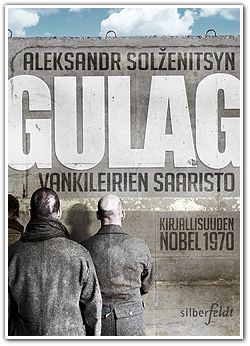
Nobel Prize 1970: Aleksandr Solzhenitsyn
After falling out with her original publisher, WSOY, in 2010, author Sofi Oksanen – whose third novel, Puhdistus (Purge, 2008), has become an international best-seller – has founded a new publishing company, Silberfeldt, in 2011, with the aim of publishing paperback editions of her own books. Its first release was a paperback version of Oksanen’s second novel, Baby Jane.
Oksanen’s new novel, Kun kyyhkyset katosivat (‘When the pigeons disappeared’), again set in Estonia, will appear this autumn, published by Like (a company owned by Finnish publishing giant Otava).
However, in April Silberfeldt published a new, one-volume edition of the autobiographical novel The Gulag Archipelago by the Nobel Prize-winning author Alexandr Solzhenitsyn. This massive book was first published in the West in 1973, in the Soviet Union in 1989.
A Finnish translation was published between 1974 and 1978. Back in those days of Cold War self-censorship, Finnish publishers felt unable to take up the controversial book, and the first volume was eventually printed in Sweden. The work, finally published in three volumes, has long since been unavailable.
This time the 3,000 new copies of Solzhenitsyn’s tome sold out in a few days; a second printing is coming up soon. Oksanen regards the work as a classic that should be available to Finnish readers.
Paris match
30 June 2011 | Articles, Non-fiction
In 1889 the author and journalist Juhani Aho (1861–1921) went to Paris on a Finnish government writing bursary. In the cafés and in his apartment near Montmartre he began a novella, Yksin (‘Alone’), the showpiece for his study year. Jyrki Nummi introduces this classic text and takes a look at the international career of a writer from the far north
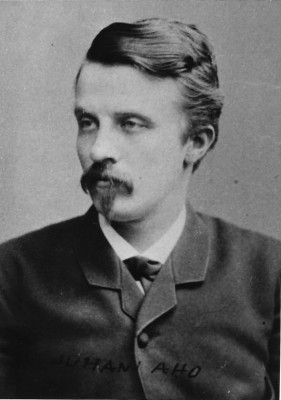
Juhani Aho. Photo: SKS/Literary archives
Yksin is the tale of a fashionable, no-longer-young ‘decadent’, alienated from his bourgeois circle, and with his aesthetic stances and social duties in crisis. He flees from his disappointments and heartbreaks to Paris, the foremost metropolis at the end of the 19th century, where solitude could be experienced in the modern manner – among crowds of people. Yksin is the first portrayal of modern city life in the newly emerging Finnish prose, unique in its time.
Aho’s story has parallels in the contemporary European literature: Karl-Joris Huysmans’s A Rebours (1884), Knut Hamsun’s Hunger (1890) and Oscar Wilde’s The Portrait of Dorian Gray (1890). More…
L’Amour à la Moulin Rouge
Extracts from the novella Yksin (‘Alone’, 1890). Introduction by Jyrki Nummi
After dining at the Duval on the Left Bank I take the same route back and drop in at the Café Régence to flick through the Finnish papers they have there.
I find my familiar café almost empty. The waiters are hanging about idly, and the billiard tables are quiet under their covers. The habitués are of course at home with their families. Anyone who has a friend or acquaintance is sharing their company this Christmas Eve. Only a few elderly gentlemen are seated there, reading papers and smoking pipes. Perhaps they’re foreigners, perhaps people for whom the café is their only home, as for me.
A little way off at the other end of the same table is a somewhat younger man. He was there when I came in. He’s finished his coffee and appears to be waiting. He’s restless and keeps consulting his watch. An agreed time has obviously passed. He calms himself and lights a cigarette. A moment later I can see a woman through the glass door. She’s hurrying across the street in front of a moving bus and running straight here. Now the man notices her too, and he cheers up and signals to the waiter for the bill. The woman slips through the door and goes straight across to him. They altercate for a moment, come to an understanding and depart hand in hand. More…
Out of the body
13 January 2011 | Reviews
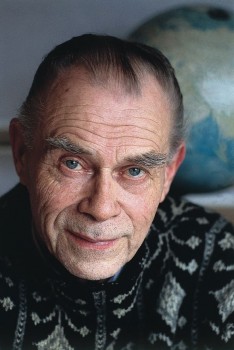
Veikko Huovinen. Photo: Irmeli Jung
‘Where will you be spending your eternity?’ ‘A spot of transmigration’, a short story by Veikko Huovinen (1927–2009), immediately confronts its main character, a man named Leevi Sytky, with this ultimate question.
Behind it is the sense of sin and fear of damnation typical of the religious life of northern Finland. Anyone who has made it as far as this final short story of Huovinen’s 1973 collection, Rasvamaksa (‘Fatty liver’) will, however, not make the mistake of taking the question too seriously; something diverting is clearly once again on offer.
Soon Leevi Sytky takes his leave of life in slightly sinful circumstances, but in the hereafter it turns out that these are not looked upon with disapproval. More…
‘Joy and peace prevail…’
25 December 2010 | Fiction, Prose
Dear readers,
to celebrate the change of the year we publish an extract from Aleksis Kivi’s 1870 classic novel, Seitsemän veljestä (Seven Brothers), translated by David Barrett, and a bit of a classic of our own too: it’s a nostalgic glimpse of a Finnish Christmas spent in a humble cottage inhabited, in addition to the eponymous seven brothers, a horse, cat, cockerel and two dogs (at least). Enjoy!
Soila Lehtonen & Hildi Hawkins & Leena Lahti
On a festive night
It is Christmas Eve. The weather has been mild, grey clouds fill the sky, hills and valleys are covered with the snow that has only recently begun to fall. The forest gives out a gentle murmur, the grouse goes to roost in the catkined birch, a flock of waxwings descends on the reddening rowan, while the magpie, daughter of the pine-wood, carries twigs for her future nest. More…
Kullervo: to be, or not?
10 September 2010 | Articles, Non-fiction
A young man is born a slave under stars that augur ill for him. He is maltreated and betrayed from birth. He cannot control his physical power, his aggression or his thirst for revenge and, finally, after fatal errors and deliberate acts of violence, his remaining desire is to die. What, in the end, did life hold for him?
The cruelly tragic story of Kullervo in the Kalevala was largely the creation of the national epic’s compiler, Elias Lönnrot (1802–1884), who put together a number of originally unconnected folk-epic fragments collected in disparate localities throughout the north and east of Finland. This process involved many stages and went on for decades. The first version was published in 1835; for a shorter version for schools in 1862 Lönnrot cut the most violent and erotic scenes – including those involving Kullervo and his sister in an incestuous encounter. More…
A day in the life of a bookseller
12 August 2010 | Reviews
The bookseller Aapeli [Abel] Muttinen, a central figure in Joel Lehtonen’s ‘Putkinotko’ books, is one of those fictional characters for whom Finnish readers have cherished a particular affection, not least because of his keen enjoyment of the pleasures they themselves so regularly share when they escape to their lakeside cottages for the summer.
But although Aapeli Muttinen is Finnish through and through, he is not without counterparts in the literature of other nations. One of his close relatives is the laziest man in all literature, Goncharov’s Oblomov; others, perhaps more surprisingly, can be found in the works of Anatole France – booksellers like Blaizot and Paillot, both gentle dilettanti with a streak of individualism and a penchant for good living. Like them, Muttinen is tolerably well-read: at the beginning of the short story ‘A happy day’ we find him musing about Horace, and at least one of Horace’s odes must have appealed to him strongly: ‘Happiest is he who, like his sires of old, / Tills his own ground, and lives his life in peace, / Far from the tumult of the noisy world.’
More…
A happy day
12 August 2010 | Fiction, Prose
‘Muttisen onni eli laulu Lyygialle’ (‘Muttinen’s happiness, or a song for Lygia’‚) a short story from Kuolleet omenapuut (‘Dead apple trees’, Otava, 1918)
‘Quite the country gentleman, eh, what, hey?’ says Aapeli Muttinen the bookseller. ‘Like the poet Horace – if I may humbly make the comparison, eh, dash it? With his villa at Tusculum, or whatever the place was called, given to him by Maecenas, in the Sabine hills, wasn’t it? – dashed if I remember. Anyway, he served Maecenas, and I serve – the public, don’t I? Selling them books at fifty pence a copy.’
Muttinen’s Tusculum is his little plot of land in the country. A delightful place, comforting to contemplate when the first signs of summer are beginning to appear, after a winter spent in town in the busy pursuit of Mammon, under skies so grey that the wrinkles on Muttinen’s forehead must have doubled in number. A summer paradise of idleness… More…
Poems
2 February 2009 | Fiction, poetry
Edith Södergran (1892–1923) was born in St Petersburg to Finland-Swedish parents; she later lived in an isolated Karelian village on the Finnish side of the Russian border. She published only six collections of poetry, in her native Swedish, before her untimely death from tuberculosis and poverty at the age of 31. Her bold, intense, sensuous and visionary poetry has made her a classic of Finnish literature. Her letters to her friend, the writer Hagar Olsson, were published in 1955.
Violet dusks
Violet dusks I bear within me from my origins,
naked maidens at play with galloping centaurs...
Yellow sunlit days with gaudy glances,
only sunbeams do true homage to a tender woman’s body...
The man has not come, has never been, will never be...
The man is a false mirror that the sun’s daughter angrily
throws against the rock-face,
the man is a lie that white children do not understand,
the man is a rotten fruit that proud lips disdain.

